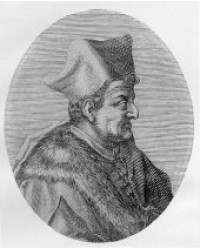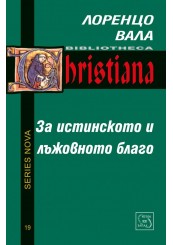Lorenzo Valla

Lorenzo (or Laurentius) Valla (1407–1457) was an Italian humanist, rhetorician, educator and Catholic priest. He is best known for his textual analysis that proved that the Donation of Constantine was a forgery.
Valla was born in Rome. His family was from Piacenza; his father, Luciave della Valla, was a lawyer who worked at the papal court.
In 1431, he entered the priesthood, and after trying in vain to secure a position as apostolic secretary, he went to Piacenza, whence he proceeded to Pavia, where he obtained a professorship of eloquence. His tenure at Pavia was made unpleasant by his attack on the Latin style of the great jurist Bartolus de Saxoferrato. Valla wandered from one university to another, accepting short engagements and lecturing in many cities.
By this time Valla had won a high reputation for two works: his dialogue De Voluptate, and his treatise De Elegantiis Latinae Linguae. In De Voluptate (On Pleasure), he contrasted the principles of the Stoics with the tenets of Epicurus, openly proclaiming his sympathy with those who claimed the right of free indulgence for man's natural appetites. It was a remarkable utterance. Here for the first time in the Renaissance the ideas of Epicurus found deliberate and positive expression in a work of scholarly and philosophical value.
Valla's originality, critical acumen, and knowledge of classical Latin style were put to good use in an essay he wrote between 1439 and 1440, De falso credita et ementita Constantini Donatione declamatio which analyzed the document known as the Constitutum Constantini (or "donatio Constantini" as he refers to it in his writings), or the Donation of Constantine.
Valla’s work in disproving the authenticity of the Donation of Constantine could be used to weaken or possibly negate the Church’s authority and claim over the territory. The essay began circulating in 1440, but was heavily rejected by the Church. It was not formally published until 1517. It became popular among Protestants.
€5.72 (11.20 лв.) €7.16 (14.00 лв.) Ex Tax: €5.25 (10.27 лв.)


